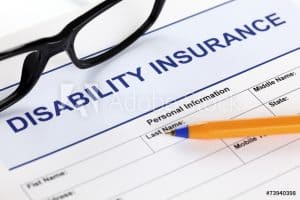Why You Cannot Count on Disability Insurance through the Government or Your Employer
There are a lot of misconceptions about disability insurance, and this is one of the reasons the industry designates May as Disability Insurance Awareness Month. Many working Americans do not have a disability policy because they believe if something happens to them then they will be covered through either their employer or the government. Sadly, when an injury or illness does occur, most find out that neither of these so-called “safety nets” provides much meaningful assistance. 
Here is an overview of Workers’ Compensation and Social Security Disability (SSDI) and why it is difficult to receive benefits through either program:
Workers’ Compensation: Most employers in the U.S. are required to carry Workers’ Compensation insurance to cover their employees. The arrangement is good for both the employer and employee; the employer provides no-fault coverage for most illnesses or injuries that occur on the job. In exchange for no-fault coverage, employees give up their right to sue their employer for damages resulting from a workplace incident.
On the surface, Workers’ Compensation sounds great, until it comes time to determine if your illness or injury is work-related. Most employers will naturally resist having to pay Workers’ Comp benefits, because the more they pay out, the higher their premiums will be.
This means your employer (and their attorneys) will heavily scrutinize any reported injury and look for a reason to deny coverage; and in order to fight their denial, you will likely need to hire your own legal counsel. Keep in mind also that even if your injury or illness is work-related, your employer may still be able to deny you if you sustained your injury while violating company policy. So bottom line: while Workers’ Compensation offers some semblance of a safety net, it is highly unreliable because there are so many ways for your coverage to be denied.
Social Security Disability Insurance (SSDI): In addition to retirement benefits, the Social Security Administration also runs a disability insurance program for those who qualify. The problem is that eligibility requirements are so stringent, the vast majority of applicants are denied. Before you can even consider applying, however, you need to be “insured” under the program. To be considered insured, you must have worked a certain number of quarters; the formula is somewhat complex, but generally you need to have averaged working at least two of every four quarters (half a year) for the most recent years prior to applying.
Once you determine you meet the qualifications to apply, you can expect to wait one to two years after lodging the application to receive an approval or denial. For roughly two-thirds of SSDI applicants, the decision is a denial. And if you choose to appeal, you have around a 15% chance of being approved upon reconsideration. At this point, if you want to keep going, you can appeal again to an administrative law judge, but your odds will not improve much at this stage unless you decide to hire an attorney.
Private Disability Insurance Fills the Gap: What happens if you are no longer able to work and are denied Workers Compensation and Social Security Disability Insurance? If your paycheck accounts for most or all of your income, this can leave you and your family bankrupt. If you obtain private disability insurance, however, you can receive a monthly benefit equal to a significant percentage of your income, allowing you to remain financially solvent while dealing with an unexpected health challenge. For $1 to $3 a day (or in some cases a little more), you can ensure that your family is taken care of during a worst-case scenario.
To learn more, speak to a disability insurance agent to discuss your specific needs and which type of insurance is right for you and your family.




